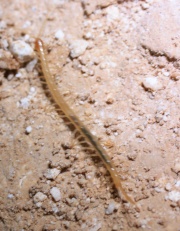Invertebrates (Inventory)/Centipede
From LagWiki
(Refine) |
(Added a reference) |
||
| Line 2: | Line 2: | ||
The '''Centipede''' field of the [[Invertebrates (Inventory)|Invertebrates]] section should list stations where a centipede is found. | The '''Centipede''' field of the [[Invertebrates (Inventory)|Invertebrates]] section should list stations where a centipede is found. | ||
| - | Centipedes | + | Centipedes have flat, multi-segmented bodies, with each segment having only one pair of legs. They are arthropods, not insects. The total number of legs varies, but there are usually 20 or more. Centipedes are predators and have 2 pincers just behind the head. The color can vary from unpigmented to brown, dark brown or rust. Their bite is painful (like a bee sting), but not fatal. They move very quickly and can be quite large and can climb well. The size can vary from small (an inch or less) to several inches in length and up to an inch in width. Centipedes should not be confused with [[Invertebrates (Inventory)/Millipede|millipedes]] which have two pairs of legs per body segment. Some centipedes are known to prey on bats. |
==See also== | ==See also== | ||
*[[Invertebrates (Inventory)/Millipede|Millipede]] | *[[Invertebrates (Inventory)/Millipede|Millipede]] | ||
| + | |||
| + | ==References== | ||
| + | *Romero, Aldemaro (2009) ''Cave Biology; Life in Darkness'' Cambridge University Press, New York pp 106-107 ISBN-Hardback: [[Special:Booksources/978-0-521-82846-8|978-0-521-82846-8]], ISBN-Paperback: [[Special:Booksources/978-0-521-53553-3|978-0-521-53553-3]] | ||
{{Cave inventory}} | {{Cave inventory}} | ||
| - | |||
Revision as of 19:53, 8 April 2012
The Centipede field of the Invertebrates section should list stations where a centipede is found.
Centipedes have flat, multi-segmented bodies, with each segment having only one pair of legs. They are arthropods, not insects. The total number of legs varies, but there are usually 20 or more. Centipedes are predators and have 2 pincers just behind the head. The color can vary from unpigmented to brown, dark brown or rust. Their bite is painful (like a bee sting), but not fatal. They move very quickly and can be quite large and can climb well. The size can vary from small (an inch or less) to several inches in length and up to an inch in width. Centipedes should not be confused with millipedes which have two pairs of legs per body segment. Some centipedes are known to prey on bats.
See also
References
- Romero, Aldemaro (2009) Cave Biology; Life in Darkness Cambridge University Press, New York pp 106-107 ISBN-Hardback: 978-0-521-82846-8, ISBN-Paperback: 978-0-521-53553-3

